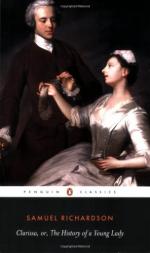There never was a firmer or nobler friendship in women, than between my dear cousin and Miss Howe, to which this wretched man had given a period.
Friendship, generally speaking, Mr. Belford, is too fervent a flame for female minds to manage: a light that but in few of their hands burns steady, and often hurries the sex into flight and absurdity. Like other extremes, it is hardly ever durable. Marriage, which is the highest state of friendship, generally absorbs the most vehement friendships of female to female; and that whether the wedlock be happy, or not.
What female mind is capable of two fervent female friendships at the same time?—This I mention as a general observation; but the friendship that subsisted between these two ladies affords a remarkable exception to it: which I account for from those qualities and attainments in both, which, were they more common, would furnish more exceptions still in favour of the sex.
Both had an enlarged, and even a liberal education: both had minds thirsting after virtuous knowledge; great readers both; great writers— [and early familiar writing I take to be one of the greatest openers and improvers of the mind that man or woman can be employed in.] Both generous. High in fortune, therefore above that dependence each on the other that frequently destroys that familiarity which is the cement of friendship. Both excelling in different ways, in which neither sought to envy the other. Both blessed with clear and distinguishing faculties; with solid sense; and, from their first intimacy, [I have many of my lights, Sir, from Mrs. Norton,] each seeing something in the other to fear, as well as to love; yet making it an indispensable condition of their friendship, each to tell the other of her failings; and to be thankful for the freedom taken. One by nature gentle; the other made so by her love and admiration of her exalted friend—impossible that there could be a friendship better calculated for duration.
I must, however, take the liberty to blame Miss Howe for her behaviour to Mr. Hickman. And I infer from it, that even women of sense are not to be trusted with power.
By the way, I am sure I need not desire you not to communicate to this fervent young lady the liberties I have taken with her character.
I dare say my cousin could not approve of Miss Howe’s behaviour to this gentleman; a behaviour which is talked of by as many as know Mr. Hickman and her. Can a wise young lady be easy under such censure? She must know it.
Mr. Hickman is really a very worthy man. Every body speaks well of him. But he is gentle-dispositioned, and he adores Miss Howe; and love admits not of an air of even due dignity to the object of it. Yet will Mr. Hickman hardly ever get back the reins he has yielded up; unless she, by carrying too far the power of which she seems at present too sensible, should, when she has no favours to confer which he




